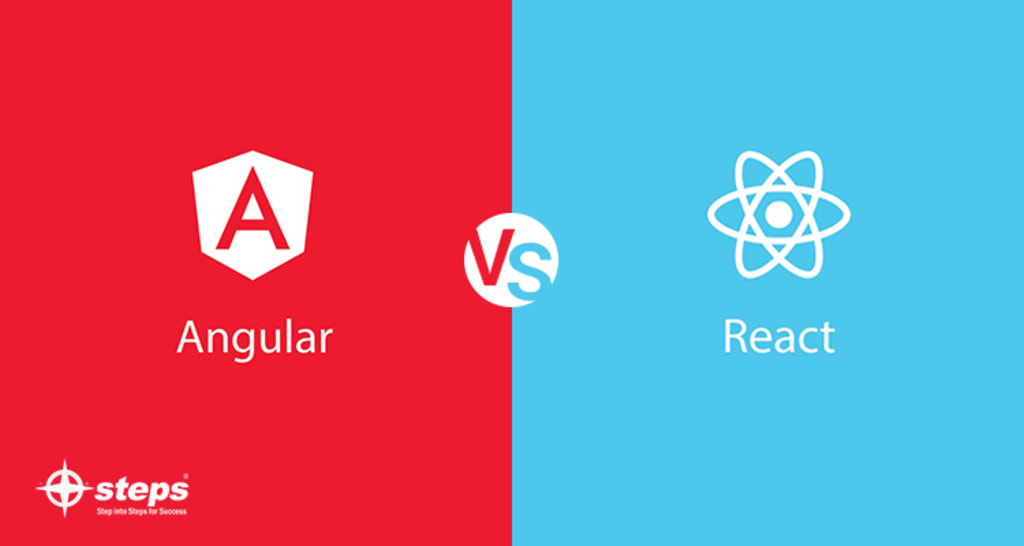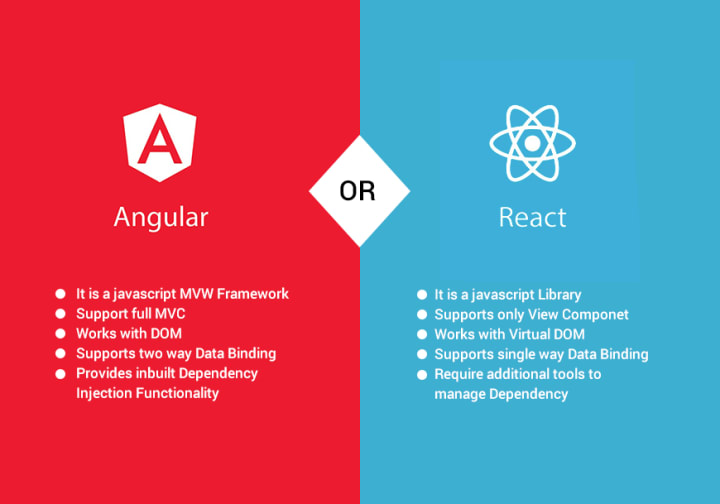React VS Angular
Angular is a full-fledged mobile and web development framework. React is a framework only for UI development, which can be turned into a full-fledged solution with the help of additional libraries. React seems simpler at first sight, and it takes less time to start working on a React project.

Componentization
AngularJS comes with a particularly fastened and complicated structure since it’s supported 3 layers: Model, View, and Controller. With the AngularJS, developers break down the app’s code in several files. This enables utilize of templates or the part in several components of the appliance.
React, on the opposite hand, chooses a special design. It offers an easy approach of developing part trees. The library comes with purposeful programming within which the part definitions ar declarative. React codes ar clear and logically structured. They are doing not raise developers to write down code during a specific approach.
Languages
React is predicated on the JavaScript ES6+ language that is combined with the JSX script. JSX is especially associate degree extension for the syntax that produces the JavaScript code jibe ones that are written in markup language. Angular uses matter or JavaScript. Since matter is extremely compact it gets easier to navigate the code and spot the typos.
UI part
Another differentiating purpose in Angular vs React is that of the UI part. The React UI tools are developed by its community. There are variety of paid and free UI parts within the React portal. Angular comes with an inherent Material techstack and comes with variety of pre-built parts of fabric style. Attributable to this, the UI configuration becomes extraordinarily quick and easy.

Directives
The logic and templates in React ar explained at the tip of each part. It permits the readers to know what the code means that even while not having to grasp its syntax. Just in case of Angular, the templates ar came back with attributes and also the syntax of Angular’s directives ar subtle and complicated, creating it incomprehensible for the emerging developers.
Popularity
As per Google Trends, React has a lot of searches than Angular. Whereas individuals show a lot of interest in Angular because of availableness of ample ready-made solutions, each of the technologies ar developing which implies each ar well-liked within the market. So for now, the solution to Angular vs React quality would be equal on each side, i.e. Angular quality = React quality (at least within the current time).
Learning Curve
Angular features a steep learning curve in comparison to React. The Google Angular IO framework offers multiple ways that to unravel a specific downside, features a complicated part management system, in addition as demands familiarity with completely different ideas and languages like templates, pipes, dependency injection, RxJS, TypeScript, etc.
Whereas, identical isn’t true for React JS framework. ReactJS permits you to simply learn associate degreed build an app within the React scheme if you’re smart with JavaScript. ReactJS provides multiple helpful resources for newcomers to know the framework and appearance forward to developing associate degree application, even once frequent updates are extended. This is often the amount of key reasons why developers tend to decide on React.
Information Binding
Another issue that influences the choice to decide on the correct framework among React and Angular is information binding.
React uses unidirectional information binding within which the UI components will be modified solely once ever-changing the model state. The developers cannot alter the UI components while not change the corresponding model state.
App Performance and User expertise
As we’ve got seen within the Vue.js vs React.js article, React uses Virtual DOM and Fiber for building applications that build it to result in AngularJS. But, the newer versions, like Angular seven has return up with options and components like ShadowAPI that has created the competition between the 2 frameworks even a lot of intense, with none falling down in terms of app size or performance.
Testing
The Angular IO testing and debugging for an entire project is feasible with one tools like shrub, drafting instrument and fate. But, this is often impracticable within the case of ReactJS app development. A collection of tools are needed for playing completely different sets of testing.
For example, you’ll need Jest for JavaScript code testing, accelerator and Unexpected-React for part testing, surface for Render testing utils, React-unit for unit testing, and so on. This will increase the efforts and time needed within the testing method.
Easy Update
Angular has associate degree improved user interface that contains commands sort of a ng_update that makes it attainable to simply upgrade the app to the newest Angular version. This makes Angular app development less painful, provided most of the change method is machine-driven.
Similarly, React conjointly offers the power to create seamless transitions between 2 versions. But, the front-end development library depends heavily on the external libraries that build it attainable to update and migrate the third-party parts. Besides, the developers have to be compelled to check all the time if the used third-party libraries are compatible with the recent versions of the JavaScript framework or not, that will increase the efforts of the developers.
Now we can conclude that both are the best choices for developing the dynamic web applications. If we trained under the top training institutes for React in Kochi it will be a great success for your carrier. Many institutions give AngularJS courses in Kochi so try to succeed your carrier for studying both the things with the best institution.
https://www.stepskochi.com/blog/react-vs-angular/?fbclid=IwAR0V1L3Fe9lmdo7gpCpp_U56EjQZYn-wUeekUt2EzCLyFU7Vqefz0tqTBYM






Comments
There are no comments for this story
Be the first to respond and start the conversation.